By: debbie lynn elias
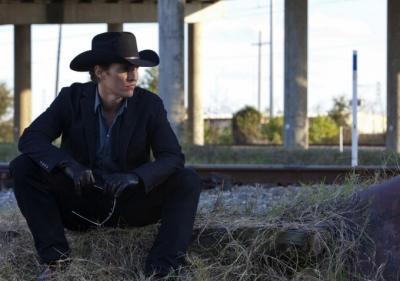
“Shame” which garnered an NC-17 rating. This year, it’s Matthew McConaughey in William Friedkin’s KILLER JOE, which the MPAA also saw fit to designate as NC-17. And let me say up front, while the rating is warranted due to nudity and extreme sexual innuendo innuendoand one intensely brutal scene, Friedkin mesmerizes with his exploration of the psyche, fear, manipulation and control, pushing the envelope into the controlled psychological stratosphere, eliciting not only an Oscar worthy performance from McConaughey (who does the best work of his career), but delivers a film that is completely unpredictable, surprising, and leaves you hanging on tenterhooks wanting more. Brilliant!
Chris is a 22-year old screw-up. Essentially estranged from his family, but for showing up at his dad’s trailer to flop when he has no money and nowhere to stay (or needs a place to hide), he is in debt up to his eyeballs with the local drug kingpin. But Chris has a plan – kill his mother for her $50,000 life insurance policy. Conning his dad Ansel into participating in the scam, it’s clear a professional is needed for the job. Thanks to a local barfly, Chris gets turned onto “Killer” Joe Cooper, a Dallas cop who moonlights on the side as a contract killer. One problem though. Joe gets paid. Up front. And Chris has no cash. But Joe is willing to accept another form of payment – Chris’ sister, Dottie.
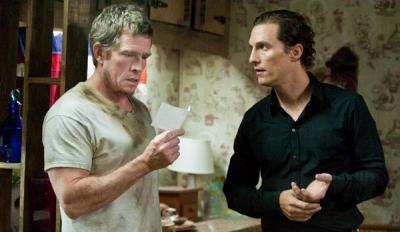
As the plan takes shape, the relationship between Joe and Dottie intensifies, turning into what one might call a twisted-Cinderella story, concentrating on the moral duality of Joe. But as with most children who rant and rave and storm about yelling about wanting their parents dead, Chris starts to get cold feet; sadly, it’s not in time to stop the hit. As the family, including Ansel’s money-grubbing second wife Sharla, try to lay claim to the insurance money, truths and allegiances spill out leading to a “killer” climax.
This is Matthew McConaughey’s Oscar moment. With a tour de force performance, the controlling pathos that he brings to Joe is mesmerizing. You can’t help but be spellbound by not only the calculating methodical nature of Joe, but also hypnotized by the rapturous, slow, rhythmic Southern drawl of McConaughey’s voice as he “wills” Dottie to strip, dress, participate. But that gentlemanly polite control is then shockingly upended by an emotional explosion of violence; an interesting paradox to not only the controlled calm of his persona, but the controlled calm in which he kills. One is breathless from the rage, the fury and the insanity that takes hold in Act 3.
Thomas Haden Church is an absolute scene stealer. The naivete and backwoods stupidity-with-blinders-on that he brings to Ansel is raw, organic and very funny. From where did Gina Gershon pull her performance? Throughout the body of her work, never did I see her capable of this. Nothing surprising about her as Sharla in Acts 1 and 2, but get to that 20 minute climactic finale and she is just raw emotion. Caught in a lie, Sharla has more than met her match with Joe, and Gershon just gives it her all, so much so that a supporting Oscar nod could come her way.
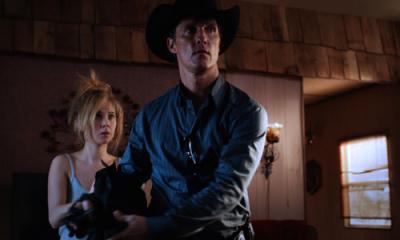
And then there’s Juno Temple. Falling in love with her acting in Dirty Girl where she was finally given a chance to soar, now she delivers an even deeper, more textured and nuanced performance as Dottie. Her chemistry with McConaughey is spellbinding from the get-go. As I say above, McConaughey is hypnotic and nevermoreso than in his dinner date scene with Dottie. The timing and physical nuance that Temple brings to the table, laced with innocent naivete in that scene is breathtaking. And then in the filmfs climactic moments, WOW! With an almost subconscious decisiveness, Temple flourishes in the chaos. And much of that WOW goes to Friedkin, and of course, cinematographer Caleb Deschanel and editor Darrin Navarro.
I hate to say it, but the one annoyance I have with the film is Emile Hirsch. As Chris, his frenetic, coked-out haphazardness often jolts one out of the moment – and not in a good way. He’s just too over-the-top. Granted, it further defines the differences between Joe and Chris and Chris and everyone else, but Hirsch is just too much. Less is more in his case.
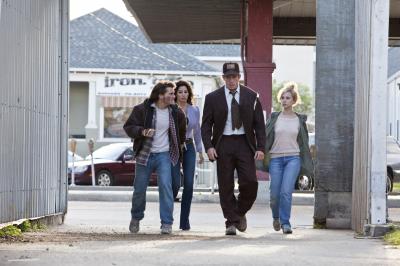
Leave it to screenwriter Tracy Letts to create a world with characters both this enigmatic and charismatic. Rapier sharp timing and creation of specific character traits propel the film ever forward, “sucking” the audience ever deeper into this riveting tale. Making the experience even sweeter is that this is believable; I can easily see running into these characters on the street. You know they exist. And with Joe himself, Letts brings to life what many people often posit about law enforcement – they make the best criminals.
The emotional wasteland of the characters as a whole and their yearning for acceptance, comfort, love and family explodes through their individual traits, characteristics and mannerisms, all laced with nuanced socio-economic commentary. Joe, a loner with impeccable manners, and the way he just moves in with Dottie, Ansel and Sharla, tacitly screams for his desire to be part of a family with stability and companionship; McConaughey’s performance goes so far as to even cause one to wonder if Joe thought that being well mannered and polite would make people like and respect him, that that’s what it takes to be part of a family. He seems influenced by Norman Rockwell paintings. Ansel goes through life as if a boxer punched in the head so many times so as to be numb to the world around him, never reaching for the brass ring or having any aspiration too. And Dottie is wise beyond her years. She has a third eye with which she see outside the box; sees people for who they are; sees a future beyond life in the double wide trailer; sees life without a clingy, useless brother; and feels with her heart.
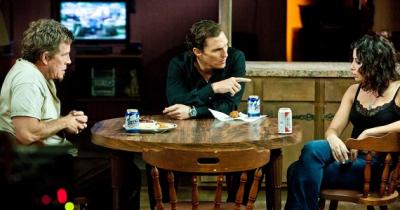
Vividly cinematic, director William Friedkin dives into an at times stereotypical world of poverty, illiteracy and “trailer trash” with visceral physical and emotional brutality making KILLER JOE an eye-opening, heart stopping, voyeuristic experience for the audience. Peeling back the layers of this world and the people in it, Friedkin is masterful at exposing the evil – and potential for evil – that lies within us all, making it impossible for one to turn away from what’s unfolding on the screen.
Not one to ever overlook a detail and using everything at his disposal to elicit full emotional impact on screen, Friedkin turns to his costumers in designing the look of Killer Joe. Always wearing black, Joe is the epitome of whole “black hat/bad boy” cowboy image so ingrained in our psyche as testament to the battle of good versus evil, which up until a certain point Joe’s outward manners belie, but it also metaphorically serves to show Joe hiding his true self in the darkness. Similarly, employing the tried and true Southern etiquette of family meals and calling on one of the most famous Southern dishes of all, fried chicken, Friedkin hurls us wide-eyed and open-mouthed into the true twisted darkness that is KILLER JOE.
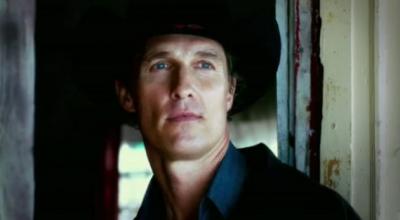
Caleb Deschanel’s lensing and framing is perfect, honing in on intimate pictures of a world hidden behind the door of the double wide trailer. There is nothing wide or expansive about the visuals of the film; everything is contained, confined, claustrophobic – mirroring the closeted emotions and lives of each of the characters. Framing in doorways and alleys further compartmentalizes the fractured family and provides a tacit sense of confusion yet plenty of options as to what path to choose.
Friedkin kills it with KILLER JOE.
“Killer” Joe Cooper – Matthew McConaughey
Dottie – June Temple
Chris – Emile Hirsch
Ansel – Thomas Haden Church
Sharla – Gina Gershon
Directed by William Friedkin.
Written by Tracy Letts based on his award-winning play of the same name.











